Corporate Social Responsibility Research Proposal: Saudi Arabia
VerifiedAdded on 2022/11/19
|14
|2713
|450
Project
AI Summary
This research proposal investigates Corporate Social Responsibility (CSR) within the context of Saudi Arabian businesses. It begins with an overview, problem statement, research rationale, aim, objectives, and research questions, setting the stage for an exploration of CSR practices in the region. A literature review defines CSR, examines its changing agenda, and considers its application in the Middle East and specifically in Saudi Arabia. The methodology outlines an interpretivism philosophy, deductive approach, and exploratory research design employing case studies of five Saudi Arabian companies across various sectors. Secondary data and qualitative data analysis are planned to identify CSR practices. The expected outcome anticipates a lack of effective CSR measures. The proposal concludes with a timeframe and references, aiming to uncover the existing CSR practices within the business industry of Saudi Arabia and how corporate entrepreneurs are trying to manage CSR activities effectively, as well as the influence of government policies.
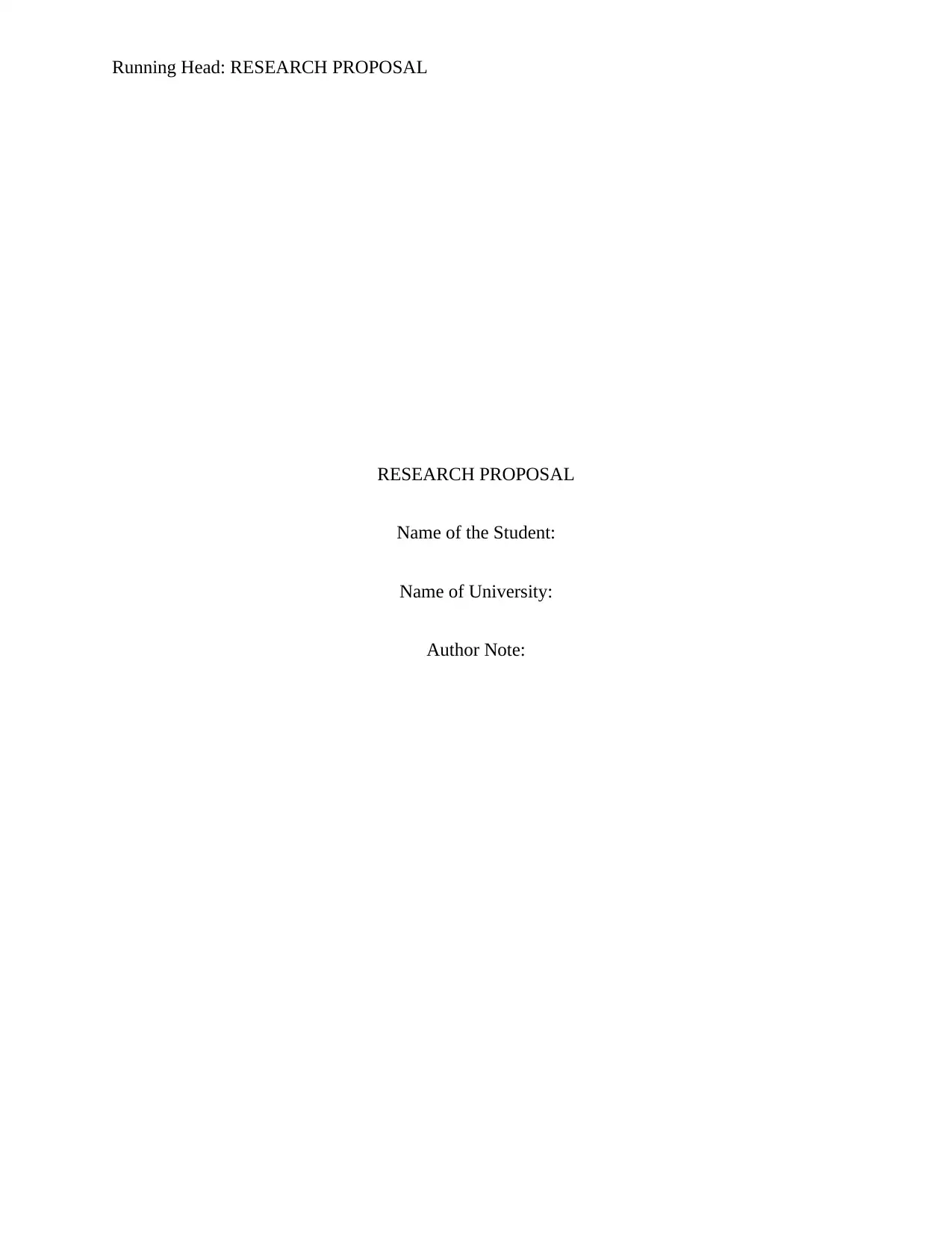
Running Head: RESEARCH PROPOSAL
RESEARCH PROPOSAL
Name of the Student:
Name of University:
Author Note:
RESEARCH PROPOSAL
Name of the Student:
Name of University:
Author Note:
Paraphrase This Document
Need a fresh take? Get an instant paraphrase of this document with our AI Paraphraser
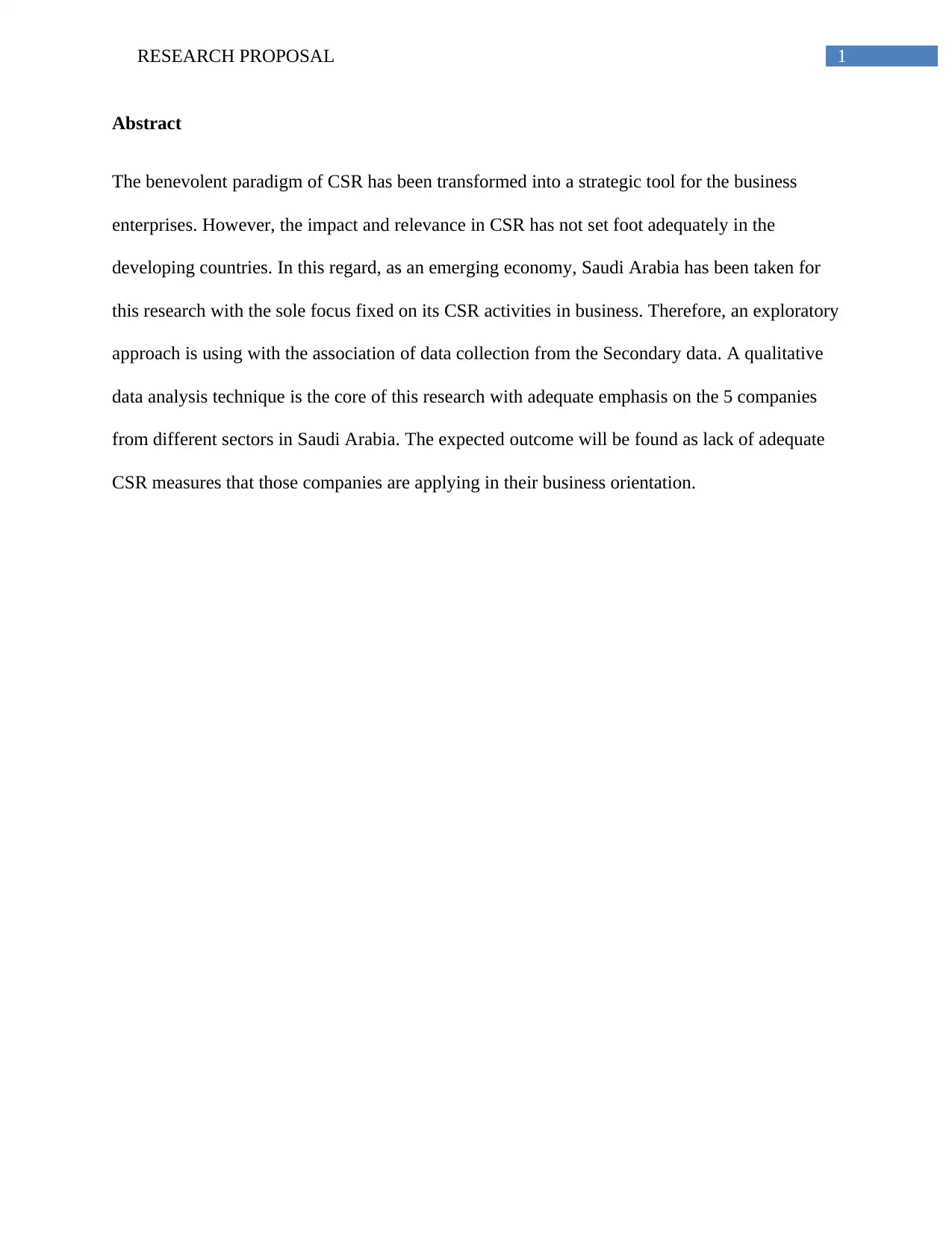
1RESEARCH PROPOSAL
Abstract
The benevolent paradigm of CSR has been transformed into a strategic tool for the business
enterprises. However, the impact and relevance in CSR has not set foot adequately in the
developing countries. In this regard, as an emerging economy, Saudi Arabia has been taken for
this research with the sole focus fixed on its CSR activities in business. Therefore, an exploratory
approach is using with the association of data collection from the Secondary data. A qualitative
data analysis technique is the core of this research with adequate emphasis on the 5 companies
from different sectors in Saudi Arabia. The expected outcome will be found as lack of adequate
CSR measures that those companies are applying in their business orientation.
Abstract
The benevolent paradigm of CSR has been transformed into a strategic tool for the business
enterprises. However, the impact and relevance in CSR has not set foot adequately in the
developing countries. In this regard, as an emerging economy, Saudi Arabia has been taken for
this research with the sole focus fixed on its CSR activities in business. Therefore, an exploratory
approach is using with the association of data collection from the Secondary data. A qualitative
data analysis technique is the core of this research with adequate emphasis on the 5 companies
from different sectors in Saudi Arabia. The expected outcome will be found as lack of adequate
CSR measures that those companies are applying in their business orientation.
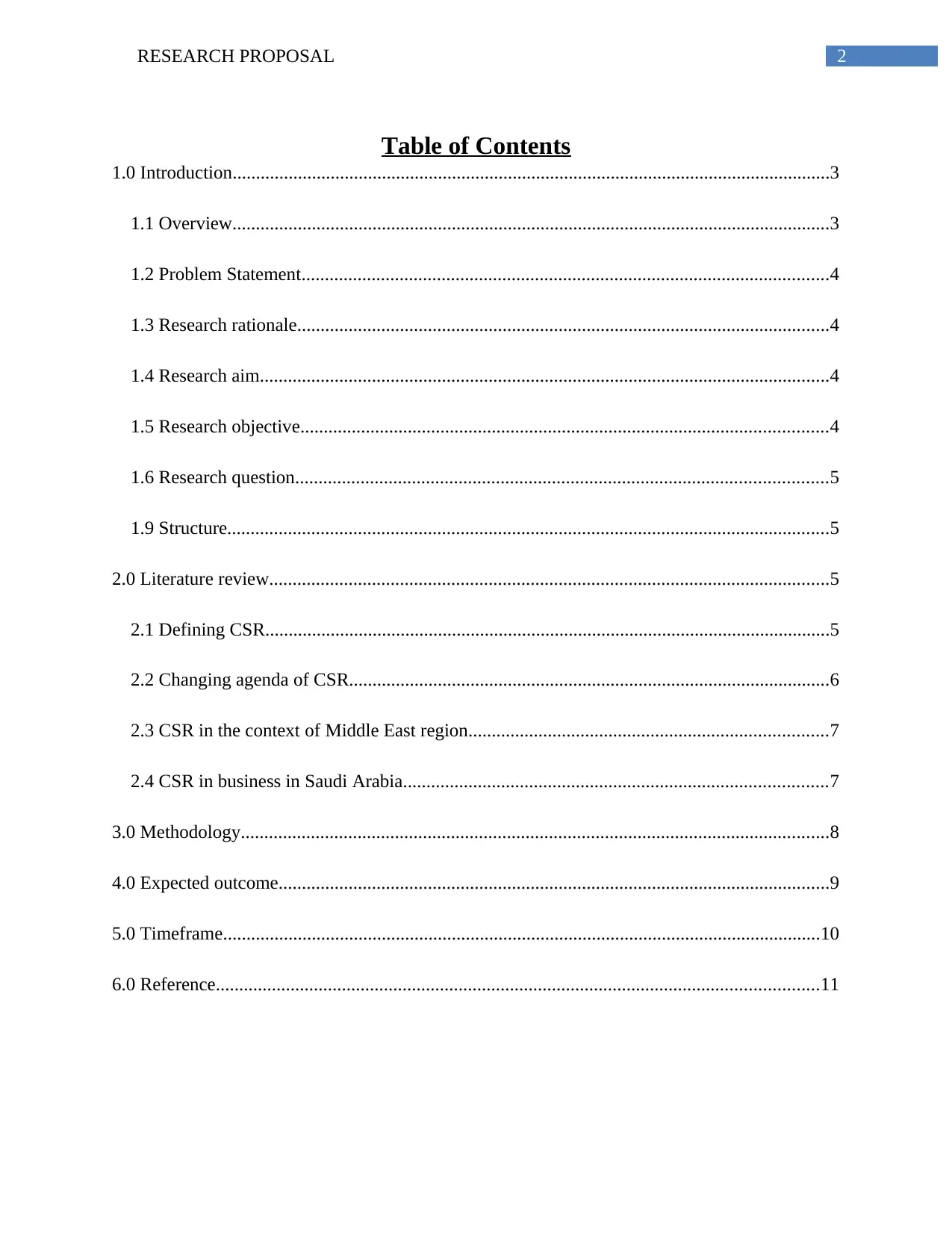
2RESEARCH PROPOSAL
Table of Contents
1.0 Introduction................................................................................................................................3
1.1 Overview................................................................................................................................3
1.2 Problem Statement.................................................................................................................4
1.3 Research rationale..................................................................................................................4
1.4 Research aim..........................................................................................................................4
1.5 Research objective.................................................................................................................4
1.6 Research question..................................................................................................................5
1.9 Structure.................................................................................................................................5
2.0 Literature review........................................................................................................................5
2.1 Defining CSR.........................................................................................................................5
2.2 Changing agenda of CSR.......................................................................................................6
2.3 CSR in the context of Middle East region.............................................................................7
2.4 CSR in business in Saudi Arabia...........................................................................................7
3.0 Methodology..............................................................................................................................8
4.0 Expected outcome......................................................................................................................9
5.0 Timeframe................................................................................................................................10
6.0 Reference.................................................................................................................................11
Table of Contents
1.0 Introduction................................................................................................................................3
1.1 Overview................................................................................................................................3
1.2 Problem Statement.................................................................................................................4
1.3 Research rationale..................................................................................................................4
1.4 Research aim..........................................................................................................................4
1.5 Research objective.................................................................................................................4
1.6 Research question..................................................................................................................5
1.9 Structure.................................................................................................................................5
2.0 Literature review........................................................................................................................5
2.1 Defining CSR.........................................................................................................................5
2.2 Changing agenda of CSR.......................................................................................................6
2.3 CSR in the context of Middle East region.............................................................................7
2.4 CSR in business in Saudi Arabia...........................................................................................7
3.0 Methodology..............................................................................................................................8
4.0 Expected outcome......................................................................................................................9
5.0 Timeframe................................................................................................................................10
6.0 Reference.................................................................................................................................11
⊘ This is a preview!⊘
Do you want full access?
Subscribe today to unlock all pages.

Trusted by 1+ million students worldwide
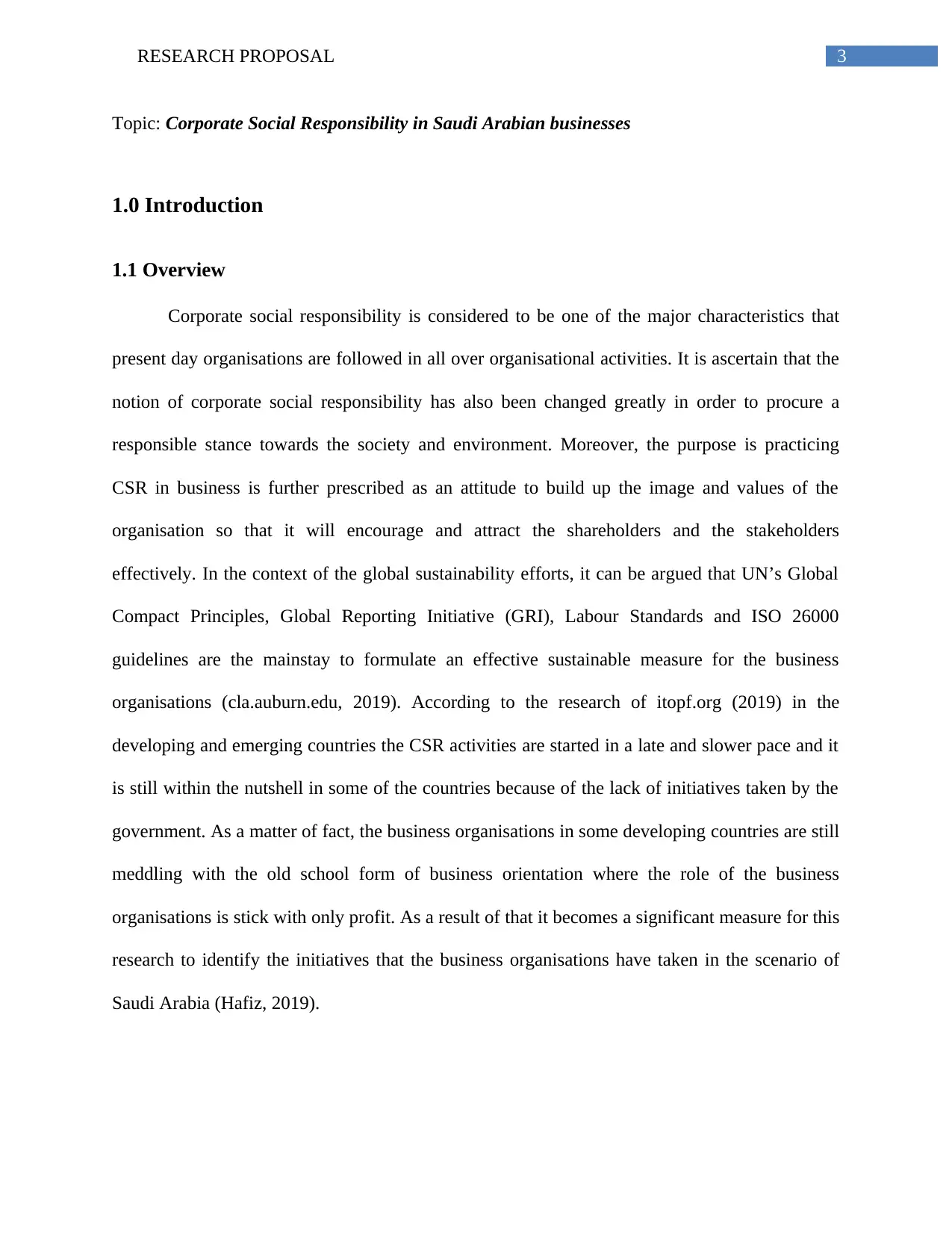
3RESEARCH PROPOSAL
Topic: Corporate Social Responsibility in Saudi Arabian businesses
1.0 Introduction
1.1 Overview
Corporate social responsibility is considered to be one of the major characteristics that
present day organisations are followed in all over organisational activities. It is ascertain that the
notion of corporate social responsibility has also been changed greatly in order to procure a
responsible stance towards the society and environment. Moreover, the purpose is practicing
CSR in business is further prescribed as an attitude to build up the image and values of the
organisation so that it will encourage and attract the shareholders and the stakeholders
effectively. In the context of the global sustainability efforts, it can be argued that UN’s Global
Compact Principles, Global Reporting Initiative (GRI), Labour Standards and ISO 26000
guidelines are the mainstay to formulate an effective sustainable measure for the business
organisations (cla.auburn.edu, 2019). According to the research of itopf.org (2019) in the
developing and emerging countries the CSR activities are started in a late and slower pace and it
is still within the nutshell in some of the countries because of the lack of initiatives taken by the
government. As a matter of fact, the business organisations in some developing countries are still
meddling with the old school form of business orientation where the role of the business
organisations is stick with only profit. As a result of that it becomes a significant measure for this
research to identify the initiatives that the business organisations have taken in the scenario of
Saudi Arabia (Hafiz, 2019).
Topic: Corporate Social Responsibility in Saudi Arabian businesses
1.0 Introduction
1.1 Overview
Corporate social responsibility is considered to be one of the major characteristics that
present day organisations are followed in all over organisational activities. It is ascertain that the
notion of corporate social responsibility has also been changed greatly in order to procure a
responsible stance towards the society and environment. Moreover, the purpose is practicing
CSR in business is further prescribed as an attitude to build up the image and values of the
organisation so that it will encourage and attract the shareholders and the stakeholders
effectively. In the context of the global sustainability efforts, it can be argued that UN’s Global
Compact Principles, Global Reporting Initiative (GRI), Labour Standards and ISO 26000
guidelines are the mainstay to formulate an effective sustainable measure for the business
organisations (cla.auburn.edu, 2019). According to the research of itopf.org (2019) in the
developing and emerging countries the CSR activities are started in a late and slower pace and it
is still within the nutshell in some of the countries because of the lack of initiatives taken by the
government. As a matter of fact, the business organisations in some developing countries are still
meddling with the old school form of business orientation where the role of the business
organisations is stick with only profit. As a result of that it becomes a significant measure for this
research to identify the initiatives that the business organisations have taken in the scenario of
Saudi Arabia (Hafiz, 2019).
Paraphrase This Document
Need a fresh take? Get an instant paraphrase of this document with our AI Paraphraser
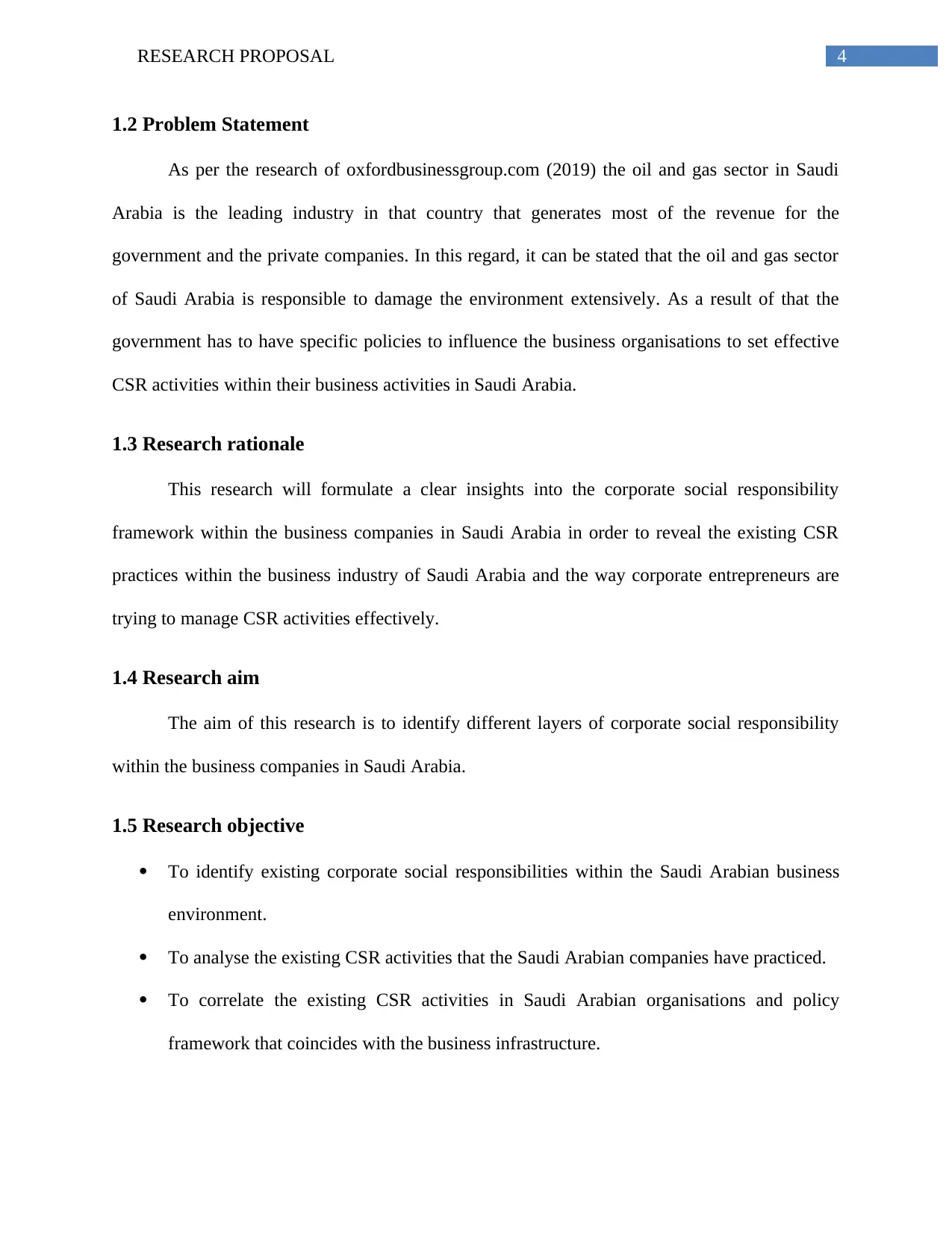
4RESEARCH PROPOSAL
1.2 Problem Statement
As per the research of oxfordbusinessgroup.com (2019) the oil and gas sector in Saudi
Arabia is the leading industry in that country that generates most of the revenue for the
government and the private companies. In this regard, it can be stated that the oil and gas sector
of Saudi Arabia is responsible to damage the environment extensively. As a result of that the
government has to have specific policies to influence the business organisations to set effective
CSR activities within their business activities in Saudi Arabia.
1.3 Research rationale
This research will formulate a clear insights into the corporate social responsibility
framework within the business companies in Saudi Arabia in order to reveal the existing CSR
practices within the business industry of Saudi Arabia and the way corporate entrepreneurs are
trying to manage CSR activities effectively.
1.4 Research aim
The aim of this research is to identify different layers of corporate social responsibility
within the business companies in Saudi Arabia.
1.5 Research objective
To identify existing corporate social responsibilities within the Saudi Arabian business
environment.
To analyse the existing CSR activities that the Saudi Arabian companies have practiced.
To correlate the existing CSR activities in Saudi Arabian organisations and policy
framework that coincides with the business infrastructure.
1.2 Problem Statement
As per the research of oxfordbusinessgroup.com (2019) the oil and gas sector in Saudi
Arabia is the leading industry in that country that generates most of the revenue for the
government and the private companies. In this regard, it can be stated that the oil and gas sector
of Saudi Arabia is responsible to damage the environment extensively. As a result of that the
government has to have specific policies to influence the business organisations to set effective
CSR activities within their business activities in Saudi Arabia.
1.3 Research rationale
This research will formulate a clear insights into the corporate social responsibility
framework within the business companies in Saudi Arabia in order to reveal the existing CSR
practices within the business industry of Saudi Arabia and the way corporate entrepreneurs are
trying to manage CSR activities effectively.
1.4 Research aim
The aim of this research is to identify different layers of corporate social responsibility
within the business companies in Saudi Arabia.
1.5 Research objective
To identify existing corporate social responsibilities within the Saudi Arabian business
environment.
To analyse the existing CSR activities that the Saudi Arabian companies have practiced.
To correlate the existing CSR activities in Saudi Arabian organisations and policy
framework that coincides with the business infrastructure.
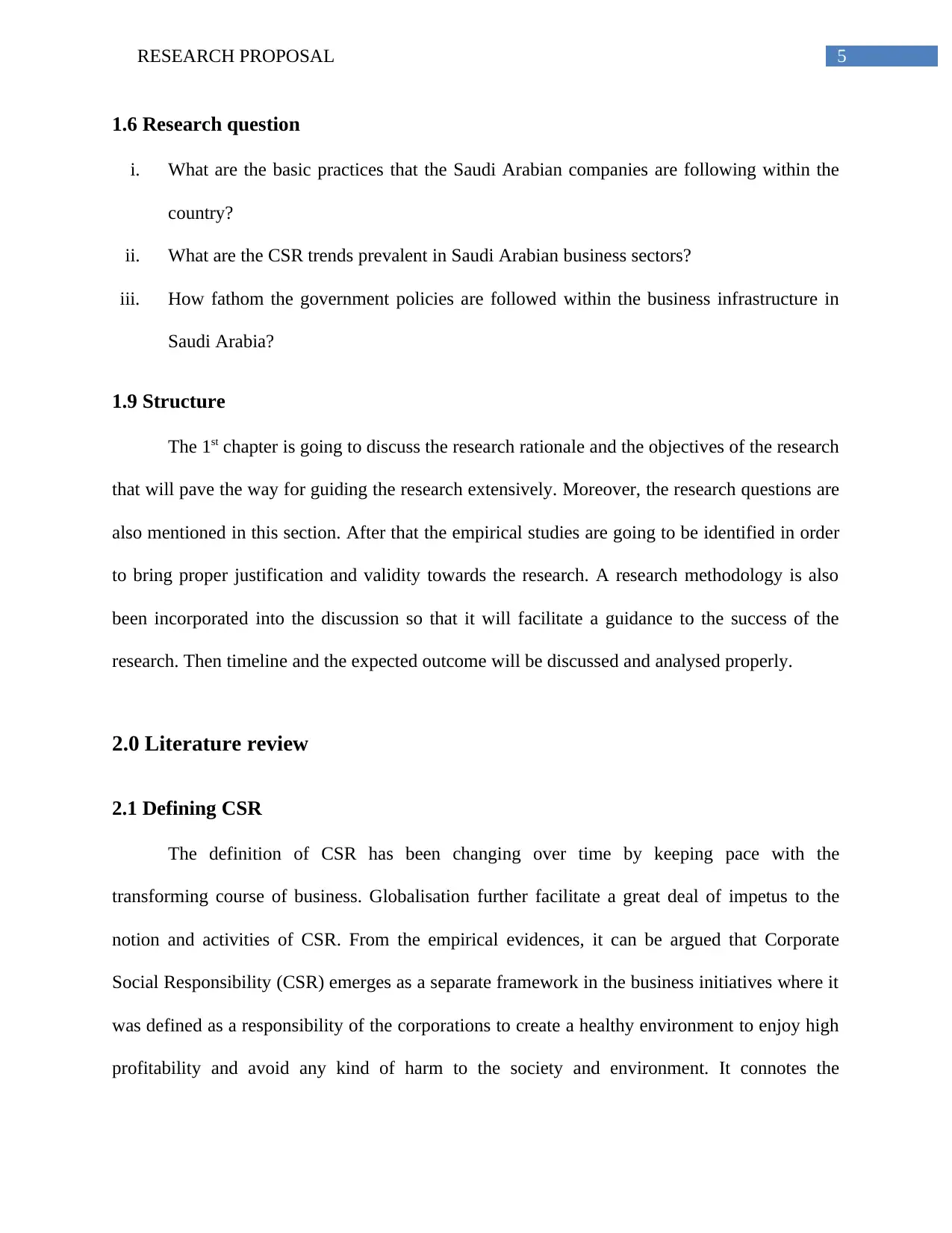
5RESEARCH PROPOSAL
1.6 Research question
i. What are the basic practices that the Saudi Arabian companies are following within the
country?
ii. What are the CSR trends prevalent in Saudi Arabian business sectors?
iii. How fathom the government policies are followed within the business infrastructure in
Saudi Arabia?
1.9 Structure
The 1st chapter is going to discuss the research rationale and the objectives of the research
that will pave the way for guiding the research extensively. Moreover, the research questions are
also mentioned in this section. After that the empirical studies are going to be identified in order
to bring proper justification and validity towards the research. A research methodology is also
been incorporated into the discussion so that it will facilitate a guidance to the success of the
research. Then timeline and the expected outcome will be discussed and analysed properly.
2.0 Literature review
2.1 Defining CSR
The definition of CSR has been changing over time by keeping pace with the
transforming course of business. Globalisation further facilitate a great deal of impetus to the
notion and activities of CSR. From the empirical evidences, it can be argued that Corporate
Social Responsibility (CSR) emerges as a separate framework in the business initiatives where it
was defined as a responsibility of the corporations to create a healthy environment to enjoy high
profitability and avoid any kind of harm to the society and environment. It connotes the
1.6 Research question
i. What are the basic practices that the Saudi Arabian companies are following within the
country?
ii. What are the CSR trends prevalent in Saudi Arabian business sectors?
iii. How fathom the government policies are followed within the business infrastructure in
Saudi Arabia?
1.9 Structure
The 1st chapter is going to discuss the research rationale and the objectives of the research
that will pave the way for guiding the research extensively. Moreover, the research questions are
also mentioned in this section. After that the empirical studies are going to be identified in order
to bring proper justification and validity towards the research. A research methodology is also
been incorporated into the discussion so that it will facilitate a guidance to the success of the
research. Then timeline and the expected outcome will be discussed and analysed properly.
2.0 Literature review
2.1 Defining CSR
The definition of CSR has been changing over time by keeping pace with the
transforming course of business. Globalisation further facilitate a great deal of impetus to the
notion and activities of CSR. From the empirical evidences, it can be argued that Corporate
Social Responsibility (CSR) emerges as a separate framework in the business initiatives where it
was defined as a responsibility of the corporations to create a healthy environment to enjoy high
profitability and avoid any kind of harm to the society and environment. It connotes the
⊘ This is a preview!⊘
Do you want full access?
Subscribe today to unlock all pages.

Trusted by 1+ million students worldwide
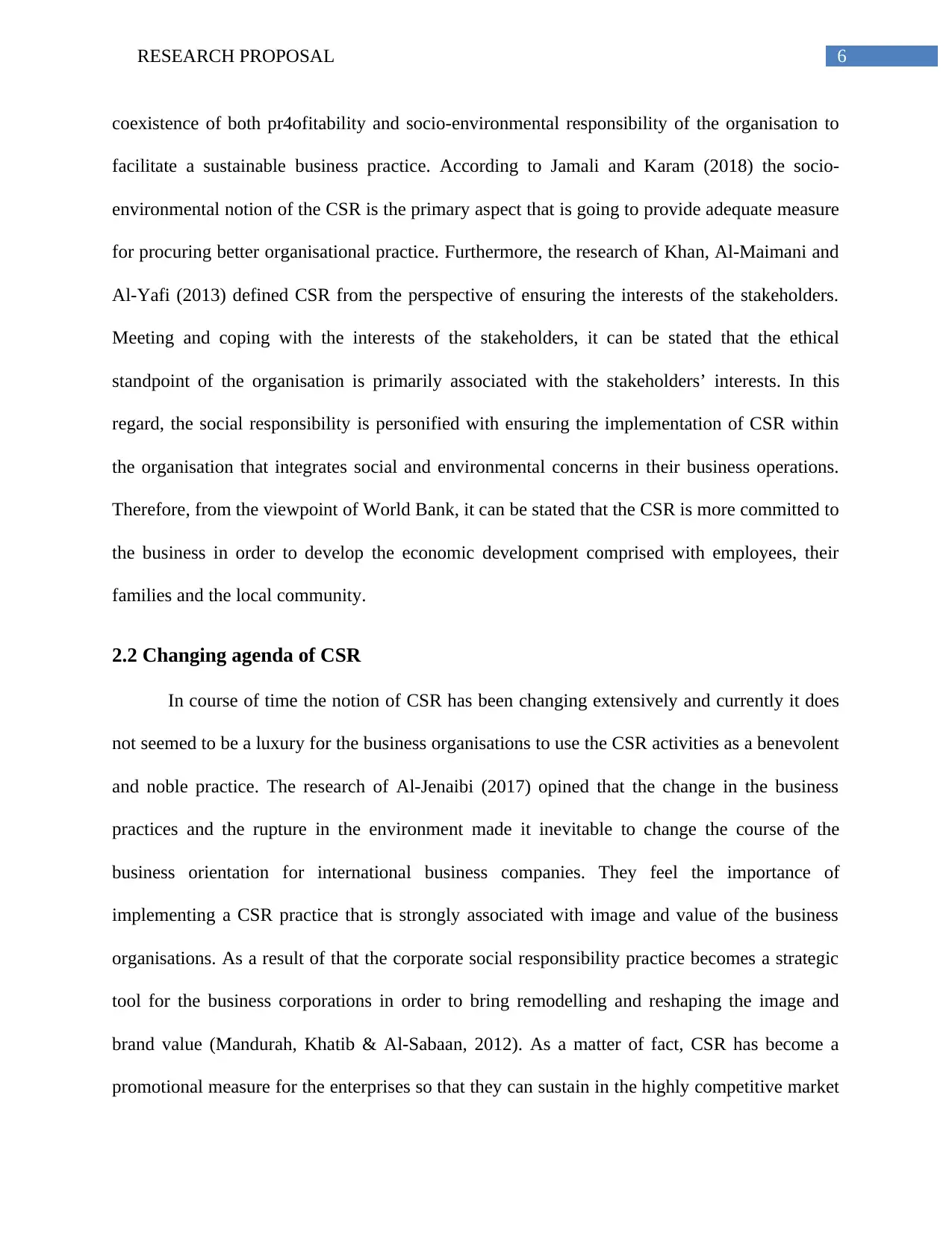
6RESEARCH PROPOSAL
coexistence of both pr4ofitability and socio-environmental responsibility of the organisation to
facilitate a sustainable business practice. According to Jamali and Karam (2018) the socio-
environmental notion of the CSR is the primary aspect that is going to provide adequate measure
for procuring better organisational practice. Furthermore, the research of Khan, Al-Maimani and
Al-Yafi (2013) defined CSR from the perspective of ensuring the interests of the stakeholders.
Meeting and coping with the interests of the stakeholders, it can be stated that the ethical
standpoint of the organisation is primarily associated with the stakeholders’ interests. In this
regard, the social responsibility is personified with ensuring the implementation of CSR within
the organisation that integrates social and environmental concerns in their business operations.
Therefore, from the viewpoint of World Bank, it can be stated that the CSR is more committed to
the business in order to develop the economic development comprised with employees, their
families and the local community.
2.2 Changing agenda of CSR
In course of time the notion of CSR has been changing extensively and currently it does
not seemed to be a luxury for the business organisations to use the CSR activities as a benevolent
and noble practice. The research of Al-Jenaibi (2017) opined that the change in the business
practices and the rupture in the environment made it inevitable to change the course of the
business orientation for international business companies. They feel the importance of
implementing a CSR practice that is strongly associated with image and value of the business
organisations. As a result of that the corporate social responsibility practice becomes a strategic
tool for the business corporations in order to bring remodelling and reshaping the image and
brand value (Mandurah, Khatib & Al-Sabaan, 2012). As a matter of fact, CSR has become a
promotional measure for the enterprises so that they can sustain in the highly competitive market
coexistence of both pr4ofitability and socio-environmental responsibility of the organisation to
facilitate a sustainable business practice. According to Jamali and Karam (2018) the socio-
environmental notion of the CSR is the primary aspect that is going to provide adequate measure
for procuring better organisational practice. Furthermore, the research of Khan, Al-Maimani and
Al-Yafi (2013) defined CSR from the perspective of ensuring the interests of the stakeholders.
Meeting and coping with the interests of the stakeholders, it can be stated that the ethical
standpoint of the organisation is primarily associated with the stakeholders’ interests. In this
regard, the social responsibility is personified with ensuring the implementation of CSR within
the organisation that integrates social and environmental concerns in their business operations.
Therefore, from the viewpoint of World Bank, it can be stated that the CSR is more committed to
the business in order to develop the economic development comprised with employees, their
families and the local community.
2.2 Changing agenda of CSR
In course of time the notion of CSR has been changing extensively and currently it does
not seemed to be a luxury for the business organisations to use the CSR activities as a benevolent
and noble practice. The research of Al-Jenaibi (2017) opined that the change in the business
practices and the rupture in the environment made it inevitable to change the course of the
business orientation for international business companies. They feel the importance of
implementing a CSR practice that is strongly associated with image and value of the business
organisations. As a result of that the corporate social responsibility practice becomes a strategic
tool for the business corporations in order to bring remodelling and reshaping the image and
brand value (Mandurah, Khatib & Al-Sabaan, 2012). As a matter of fact, CSR has become a
promotional measure for the enterprises so that they can sustain in the highly competitive market
Paraphrase This Document
Need a fresh take? Get an instant paraphrase of this document with our AI Paraphraser
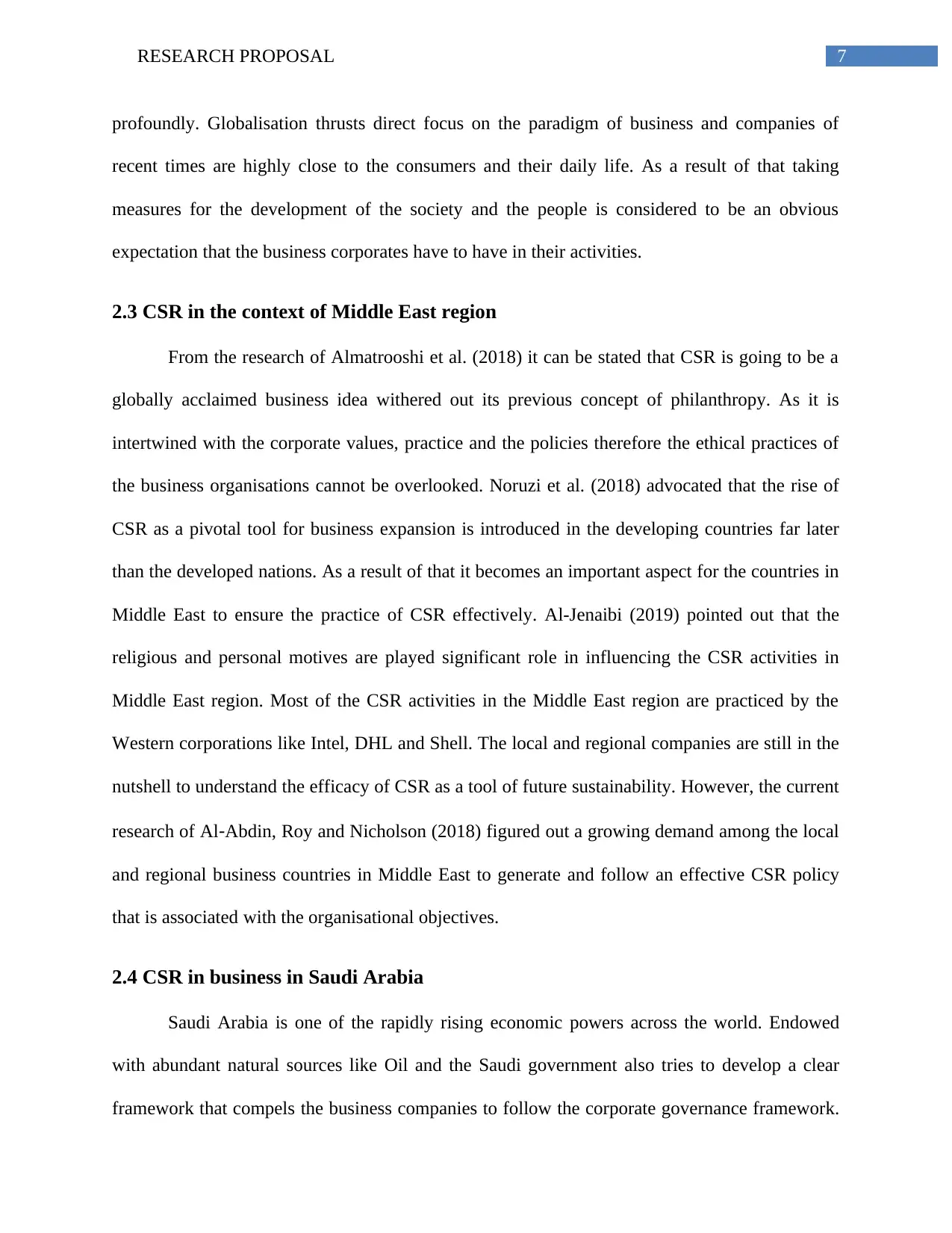
7RESEARCH PROPOSAL
profoundly. Globalisation thrusts direct focus on the paradigm of business and companies of
recent times are highly close to the consumers and their daily life. As a result of that taking
measures for the development of the society and the people is considered to be an obvious
expectation that the business corporates have to have in their activities.
2.3 CSR in the context of Middle East region
From the research of Almatrooshi et al. (2018) it can be stated that CSR is going to be a
globally acclaimed business idea withered out its previous concept of philanthropy. As it is
intertwined with the corporate values, practice and the policies therefore the ethical practices of
the business organisations cannot be overlooked. Noruzi et al. (2018) advocated that the rise of
CSR as a pivotal tool for business expansion is introduced in the developing countries far later
than the developed nations. As a result of that it becomes an important aspect for the countries in
Middle East to ensure the practice of CSR effectively. Al-Jenaibi (2019) pointed out that the
religious and personal motives are played significant role in influencing the CSR activities in
Middle East region. Most of the CSR activities in the Middle East region are practiced by the
Western corporations like Intel, DHL and Shell. The local and regional companies are still in the
nutshell to understand the efficacy of CSR as a tool of future sustainability. However, the current
research of Al‐Abdin, Roy and Nicholson (2018) figured out a growing demand among the local
and regional business countries in Middle East to generate and follow an effective CSR policy
that is associated with the organisational objectives.
2.4 CSR in business in Saudi Arabia
Saudi Arabia is one of the rapidly rising economic powers across the world. Endowed
with abundant natural sources like Oil and the Saudi government also tries to develop a clear
framework that compels the business companies to follow the corporate governance framework.
profoundly. Globalisation thrusts direct focus on the paradigm of business and companies of
recent times are highly close to the consumers and their daily life. As a result of that taking
measures for the development of the society and the people is considered to be an obvious
expectation that the business corporates have to have in their activities.
2.3 CSR in the context of Middle East region
From the research of Almatrooshi et al. (2018) it can be stated that CSR is going to be a
globally acclaimed business idea withered out its previous concept of philanthropy. As it is
intertwined with the corporate values, practice and the policies therefore the ethical practices of
the business organisations cannot be overlooked. Noruzi et al. (2018) advocated that the rise of
CSR as a pivotal tool for business expansion is introduced in the developing countries far later
than the developed nations. As a result of that it becomes an important aspect for the countries in
Middle East to ensure the practice of CSR effectively. Al-Jenaibi (2019) pointed out that the
religious and personal motives are played significant role in influencing the CSR activities in
Middle East region. Most of the CSR activities in the Middle East region are practiced by the
Western corporations like Intel, DHL and Shell. The local and regional companies are still in the
nutshell to understand the efficacy of CSR as a tool of future sustainability. However, the current
research of Al‐Abdin, Roy and Nicholson (2018) figured out a growing demand among the local
and regional business countries in Middle East to generate and follow an effective CSR policy
that is associated with the organisational objectives.
2.4 CSR in business in Saudi Arabia
Saudi Arabia is one of the rapidly rising economic powers across the world. Endowed
with abundant natural sources like Oil and the Saudi government also tries to develop a clear
framework that compels the business companies to follow the corporate governance framework.
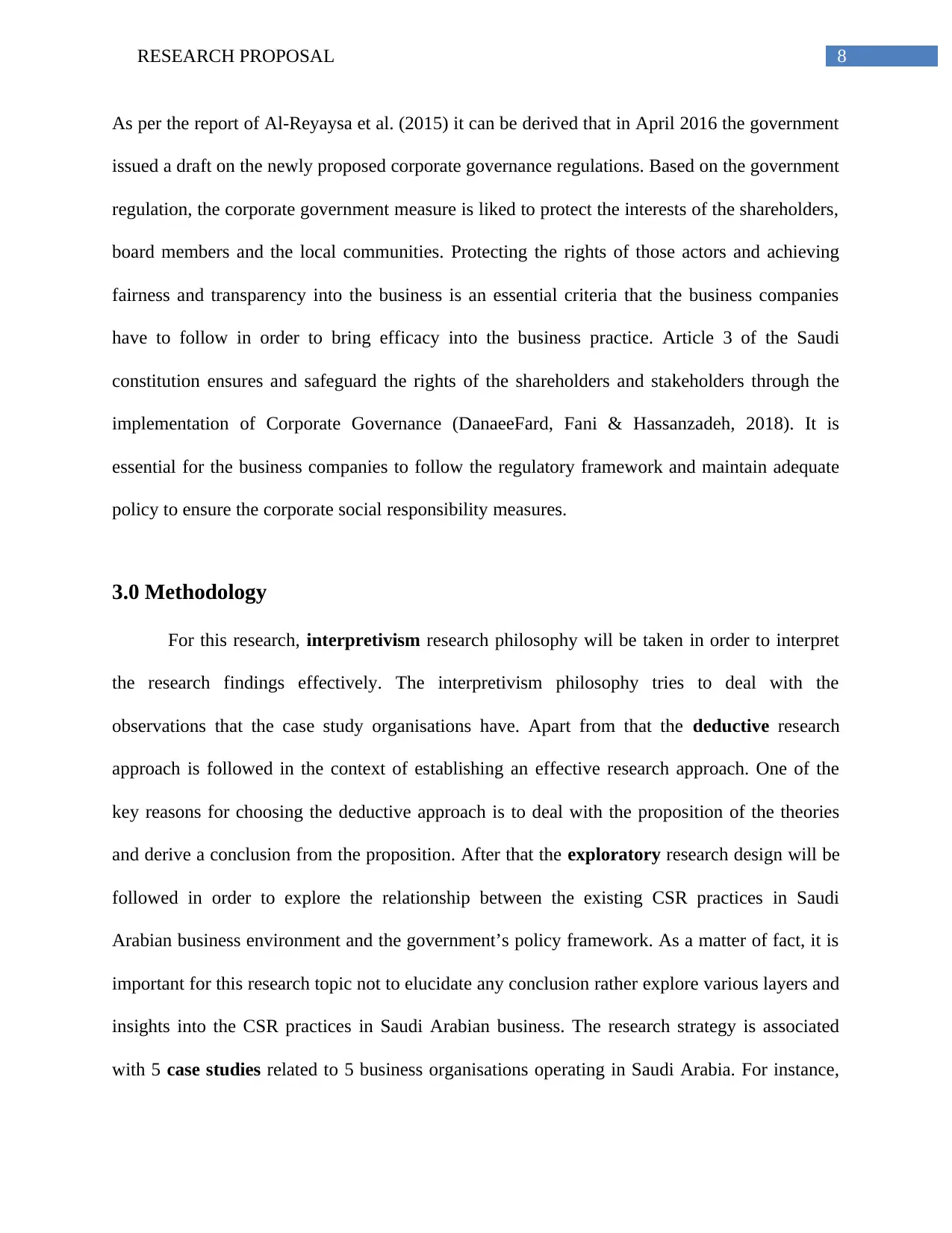
8RESEARCH PROPOSAL
As per the report of Al-Reyaysa et al. (2015) it can be derived that in April 2016 the government
issued a draft on the newly proposed corporate governance regulations. Based on the government
regulation, the corporate government measure is liked to protect the interests of the shareholders,
board members and the local communities. Protecting the rights of those actors and achieving
fairness and transparency into the business is an essential criteria that the business companies
have to follow in order to bring efficacy into the business practice. Article 3 of the Saudi
constitution ensures and safeguard the rights of the shareholders and stakeholders through the
implementation of Corporate Governance (DanaeeFard, Fani & Hassanzadeh, 2018). It is
essential for the business companies to follow the regulatory framework and maintain adequate
policy to ensure the corporate social responsibility measures.
3.0 Methodology
For this research, interpretivism research philosophy will be taken in order to interpret
the research findings effectively. The interpretivism philosophy tries to deal with the
observations that the case study organisations have. Apart from that the deductive research
approach is followed in the context of establishing an effective research approach. One of the
key reasons for choosing the deductive approach is to deal with the proposition of the theories
and derive a conclusion from the proposition. After that the exploratory research design will be
followed in order to explore the relationship between the existing CSR practices in Saudi
Arabian business environment and the government’s policy framework. As a matter of fact, it is
important for this research topic not to elucidate any conclusion rather explore various layers and
insights into the CSR practices in Saudi Arabian business. The research strategy is associated
with 5 case studies related to 5 business organisations operating in Saudi Arabia. For instance,
As per the report of Al-Reyaysa et al. (2015) it can be derived that in April 2016 the government
issued a draft on the newly proposed corporate governance regulations. Based on the government
regulation, the corporate government measure is liked to protect the interests of the shareholders,
board members and the local communities. Protecting the rights of those actors and achieving
fairness and transparency into the business is an essential criteria that the business companies
have to follow in order to bring efficacy into the business practice. Article 3 of the Saudi
constitution ensures and safeguard the rights of the shareholders and stakeholders through the
implementation of Corporate Governance (DanaeeFard, Fani & Hassanzadeh, 2018). It is
essential for the business companies to follow the regulatory framework and maintain adequate
policy to ensure the corporate social responsibility measures.
3.0 Methodology
For this research, interpretivism research philosophy will be taken in order to interpret
the research findings effectively. The interpretivism philosophy tries to deal with the
observations that the case study organisations have. Apart from that the deductive research
approach is followed in the context of establishing an effective research approach. One of the
key reasons for choosing the deductive approach is to deal with the proposition of the theories
and derive a conclusion from the proposition. After that the exploratory research design will be
followed in order to explore the relationship between the existing CSR practices in Saudi
Arabian business environment and the government’s policy framework. As a matter of fact, it is
important for this research topic not to elucidate any conclusion rather explore various layers and
insights into the CSR practices in Saudi Arabian business. The research strategy is associated
with 5 case studies related to 5 business organisations operating in Saudi Arabia. For instance,
⊘ This is a preview!⊘
Do you want full access?
Subscribe today to unlock all pages.

Trusted by 1+ million students worldwide
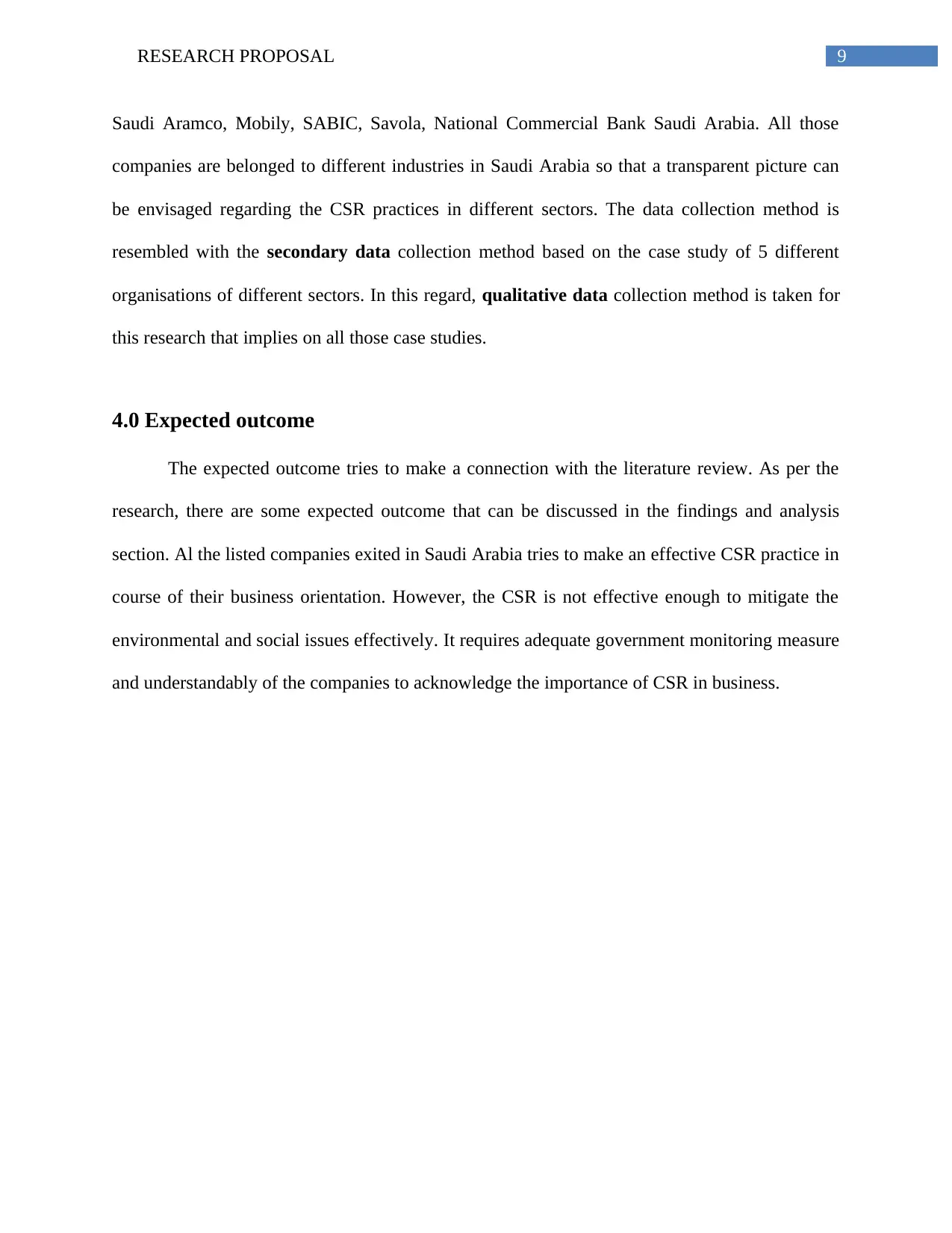
9RESEARCH PROPOSAL
Saudi Aramco, Mobily, SABIC, Savola, National Commercial Bank Saudi Arabia. All those
companies are belonged to different industries in Saudi Arabia so that a transparent picture can
be envisaged regarding the CSR practices in different sectors. The data collection method is
resembled with the secondary data collection method based on the case study of 5 different
organisations of different sectors. In this regard, qualitative data collection method is taken for
this research that implies on all those case studies.
4.0 Expected outcome
The expected outcome tries to make a connection with the literature review. As per the
research, there are some expected outcome that can be discussed in the findings and analysis
section. Al the listed companies exited in Saudi Arabia tries to make an effective CSR practice in
course of their business orientation. However, the CSR is not effective enough to mitigate the
environmental and social issues effectively. It requires adequate government monitoring measure
and understandably of the companies to acknowledge the importance of CSR in business.
Saudi Aramco, Mobily, SABIC, Savola, National Commercial Bank Saudi Arabia. All those
companies are belonged to different industries in Saudi Arabia so that a transparent picture can
be envisaged regarding the CSR practices in different sectors. The data collection method is
resembled with the secondary data collection method based on the case study of 5 different
organisations of different sectors. In this regard, qualitative data collection method is taken for
this research that implies on all those case studies.
4.0 Expected outcome
The expected outcome tries to make a connection with the literature review. As per the
research, there are some expected outcome that can be discussed in the findings and analysis
section. Al the listed companies exited in Saudi Arabia tries to make an effective CSR practice in
course of their business orientation. However, the CSR is not effective enough to mitigate the
environmental and social issues effectively. It requires adequate government monitoring measure
and understandably of the companies to acknowledge the importance of CSR in business.
Paraphrase This Document
Need a fresh take? Get an instant paraphrase of this document with our AI Paraphraser
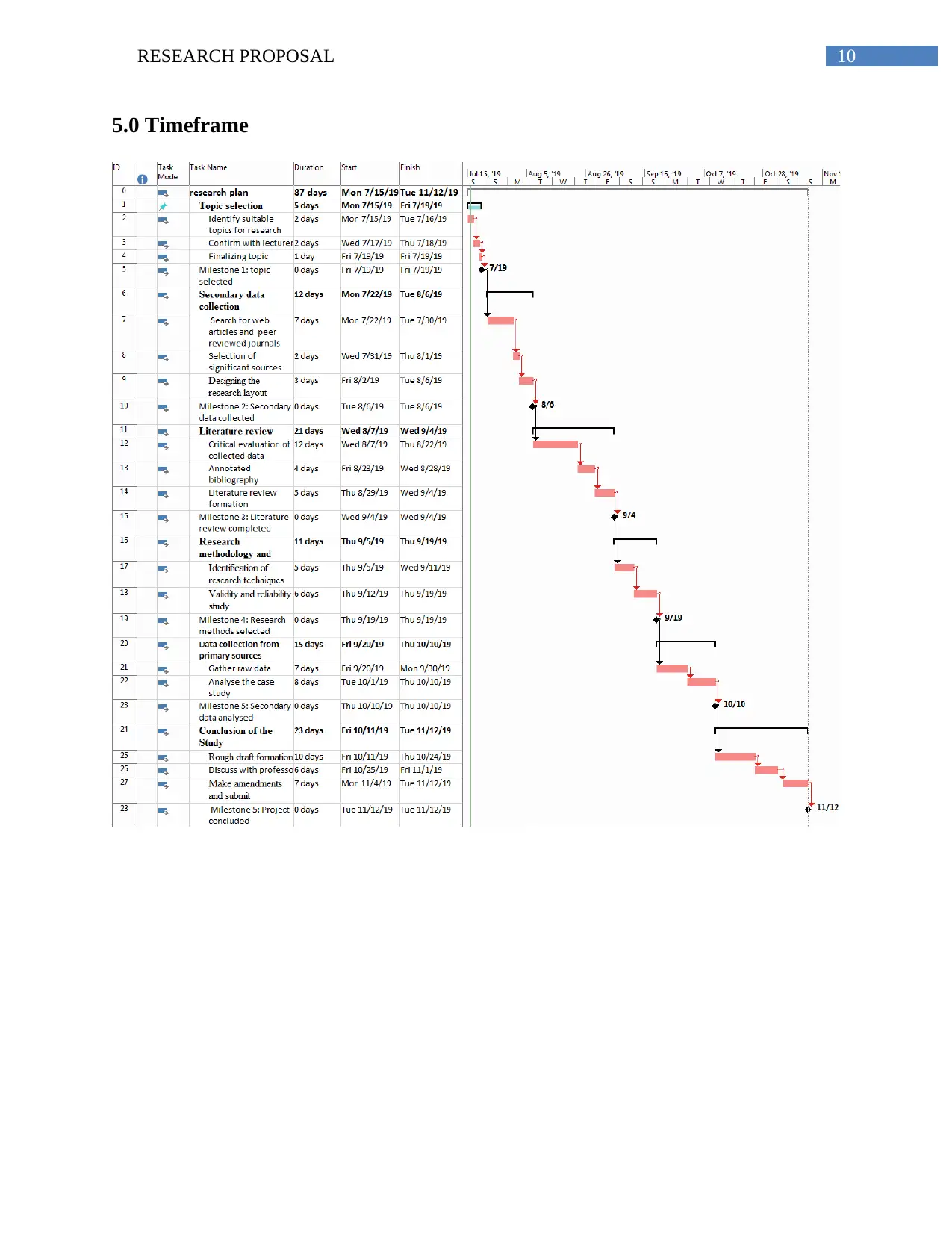
10RESEARCH PROPOSAL
5.0 Timeframe
5.0 Timeframe
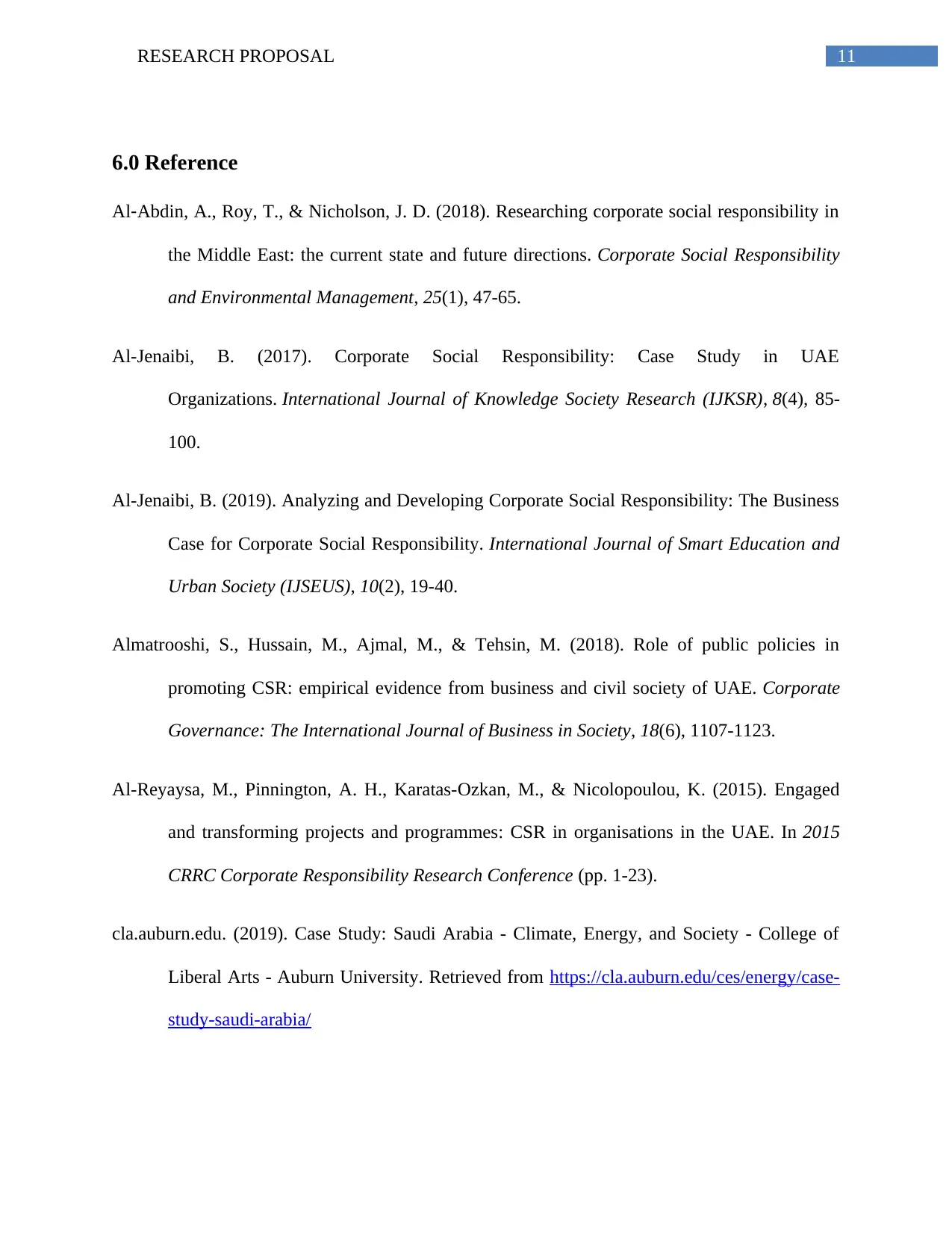
11RESEARCH PROPOSAL
6.0 Reference
Al‐Abdin, A., Roy, T., & Nicholson, J. D. (2018). Researching corporate social responsibility in
the Middle East: the current state and future directions. Corporate Social Responsibility
and Environmental Management, 25(1), 47-65.
Al-Jenaibi, B. (2017). Corporate Social Responsibility: Case Study in UAE
Organizations. International Journal of Knowledge Society Research (IJKSR), 8(4), 85-
100.
Al-Jenaibi, B. (2019). Analyzing and Developing Corporate Social Responsibility: The Business
Case for Corporate Social Responsibility. International Journal of Smart Education and
Urban Society (IJSEUS), 10(2), 19-40.
Almatrooshi, S., Hussain, M., Ajmal, M., & Tehsin, M. (2018). Role of public policies in
promoting CSR: empirical evidence from business and civil society of UAE. Corporate
Governance: The International Journal of Business in Society, 18(6), 1107-1123.
Al-Reyaysa, M., Pinnington, A. H., Karatas-Ozkan, M., & Nicolopoulou, K. (2015). Engaged
and transforming projects and programmes: CSR in organisations in the UAE. In 2015
CRRC Corporate Responsibility Research Conference (pp. 1-23).
cla.auburn.edu. (2019). Case Study: Saudi Arabia - Climate, Energy, and Society - College of
Liberal Arts - Auburn University. Retrieved from https://cla.auburn.edu/ces/energy/case-
study-saudi-arabia/
6.0 Reference
Al‐Abdin, A., Roy, T., & Nicholson, J. D. (2018). Researching corporate social responsibility in
the Middle East: the current state and future directions. Corporate Social Responsibility
and Environmental Management, 25(1), 47-65.
Al-Jenaibi, B. (2017). Corporate Social Responsibility: Case Study in UAE
Organizations. International Journal of Knowledge Society Research (IJKSR), 8(4), 85-
100.
Al-Jenaibi, B. (2019). Analyzing and Developing Corporate Social Responsibility: The Business
Case for Corporate Social Responsibility. International Journal of Smart Education and
Urban Society (IJSEUS), 10(2), 19-40.
Almatrooshi, S., Hussain, M., Ajmal, M., & Tehsin, M. (2018). Role of public policies in
promoting CSR: empirical evidence from business and civil society of UAE. Corporate
Governance: The International Journal of Business in Society, 18(6), 1107-1123.
Al-Reyaysa, M., Pinnington, A. H., Karatas-Ozkan, M., & Nicolopoulou, K. (2015). Engaged
and transforming projects and programmes: CSR in organisations in the UAE. In 2015
CRRC Corporate Responsibility Research Conference (pp. 1-23).
cla.auburn.edu. (2019). Case Study: Saudi Arabia - Climate, Energy, and Society - College of
Liberal Arts - Auburn University. Retrieved from https://cla.auburn.edu/ces/energy/case-
study-saudi-arabia/
⊘ This is a preview!⊘
Do you want full access?
Subscribe today to unlock all pages.

Trusted by 1+ million students worldwide
1 out of 14
Related Documents
Your All-in-One AI-Powered Toolkit for Academic Success.
+13062052269
info@desklib.com
Available 24*7 on WhatsApp / Email
![[object Object]](/_next/static/media/star-bottom.7253800d.svg)
Unlock your academic potential
Copyright © 2020–2026 A2Z Services. All Rights Reserved. Developed and managed by ZUCOL.





